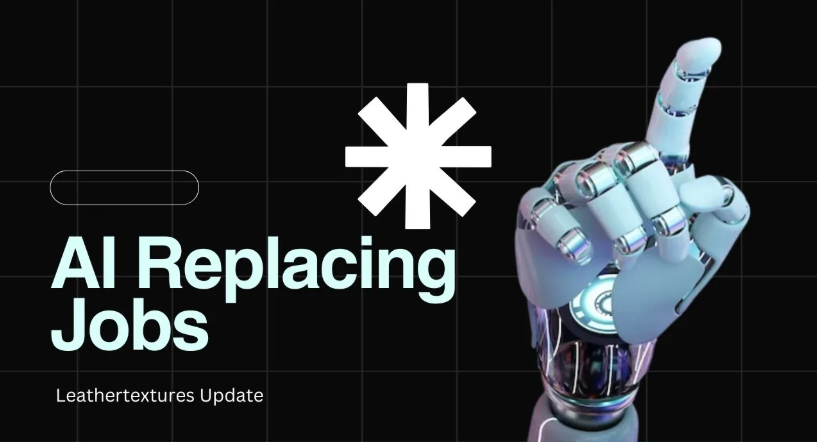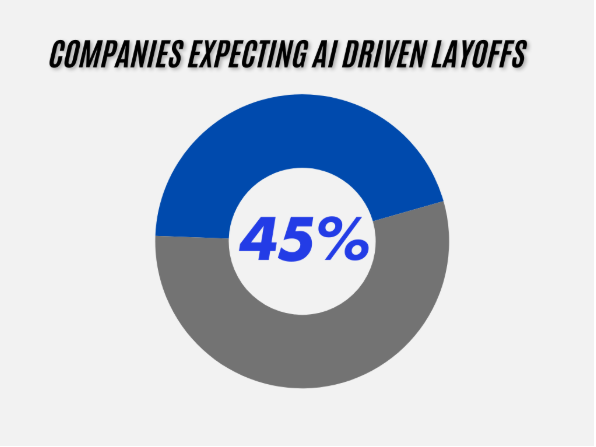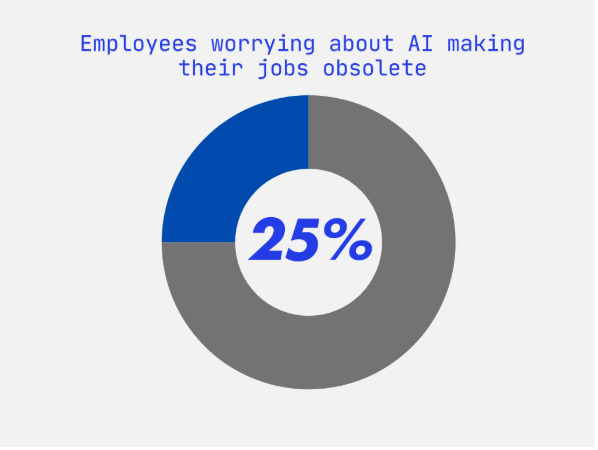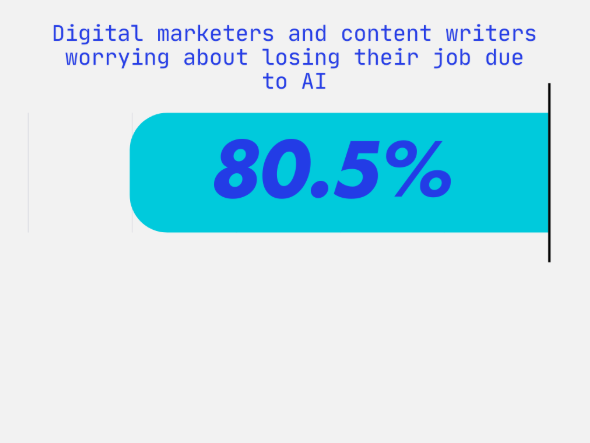
AI Replacing Jobs Statistics 2024-25
Artificial intelligence has a significant impact on the job market. Due to AI’s powerful component tools, most people are at risk of having their jobs automated.
AI can improve productivity and efficiency across industries. Besides, it creates new roles that require human intelligence and creativity. As a result, AI can effortlessly perform human tasks.
In this informative guide, we will discuss the statistics on AI replacing jobs, how many people’s jobs are at risk for AI, and how to overcome this new technology.
Table of Contents
AI Jobs Stats
- 300 million job holders can lose their jobs due to AI
- About 44% of companies are planning on using AI. That’s why there will be a lot of layoffs in 2024.
- By the end of the decade, 14% of employees will have been forced by AI to switch careers.
- About 13% of all employees have been expelled from their jobs by AI
- About 50% of the jobs at risk of replacing AI
- Around 23% of all workers are worried about AI, as they think AI will make their jobs obsolete.
- 18-24 aged workers worry than 60 aged workers that about 129% more likely AI will make their jobs obsolete.
- 15% of workers in the US consider AI to be the boss.
New AI Replacing Jobs
AI Economic Insights of Global Jobs
AI integration creates new opportunities and challenges in the global job market. Understanding AI’s impact on the job sector is essential for future workforce planning.
1. AI will bring $20.9 Trillion to the Global Economy by 2030. Thus, AI has a significant role in future economic growth.
2. AI has a vital role in improving productivity and economic output. That’s why it is expected to account for 3.5% of global GDP by 2030.
3. About 50% of jobs in developed countries are susceptible to AI automation. Hence, it highlights the need for strategic workforce planning.

AI Economic Insights of Global Jobs
4. the green economy hopes to create 7 million jobs due to AI innovations. This way, the green economy will generate 7 million new jobs and contribute to sustainable growth.
5. AI can displace over 300 million jobs globally by 2030. That’s why concerns about employment and workforce adaptation have been raised.
AI Affect In The Job Market
Artificial intelligence is changing the job market day by day. Due to its automation tasks and creation of new roles, it impacts various industries. Let’s see the effect of AI on the job sectors.
6. AI can automate 80% of workforce tasks. Also, it highlights the strategic planning in job design and workforce growth.
7. In 2027, it is expected that 23% of Current Jobs can transform for AI advancements. Thus, it is essential to adapt and reskill the workforce.
8. About 45% of office and executive work is vulnerable to automation. Also, almost half of the office and administrative roles are exposed to automation via AI. It highlights the potential for job removal in these areas.
9. In 2030, 74% of Firms Will Implement AI. Besides, most companies will adopt AI technologies.

10. In 2030, AI can Replace 300 Million Jobs globally. So, employees are concerned about replacing AI and needing workforce adaptation.
11. About 70 million new Jobs are expected post-AI transition. Likewise, it will offer new opportunities for arising sectors and roles that leverage AI technologies.
AI Stats Or AI Replacing Jobs Statistics
Regarding AI replacing job statistics, it is a wake-up call to understand how automation reshapes work. Based on AI statistics 2024, these stats emphasize the importance of adjusting to an AI-driven job market.
12. Based on a 2023 survey by the Heldrich Center for Workforce Development, about 40% of U.S. Workers are Concerned About AI-induced job Loss.
13. 70% of U.S. workers are concerned about AI in HR decisions. Also, the study says most US employees worry about their promotions, fairness, and transparency.
14. Based on a Resume Builder survey, over 37% of companies utilizing AI realized AI technology had replaced specific roles within their organizations.
15. A Resume Builder survey also says 80% of Companies think that employees can retain their jobs by adopting AI skills. Similarly, it emphasizes the importance of upskilling in the evolving job market.
16. Between November 2022 and 2023, job advertisements on Linkedin, especially in English, mentioned GPT, which increased 21-fold. It proves the growing demand for AI-related skills in the job market.
17. We are safe from AI replacement in agriculture, logistics, and teaching.
18. 45% of Companies expect AI-driven layoffs in 2024. Most companies plan to use AI, and as a result, significant workforce changes will be shown.

19. By 2030, 15% of workers may change careers due to AI, which equals 375 million.
20. In the USA, about 50% of Jobs in advanced economies are at risk from AI. That means there is a need for strategic workforce planning.
21. 27% of Jobs in low-income countries revealed to AI Automation
22. Nearly 25% of employees are concerned about AI. They think AI Will Make their Jobs Obsolete. Thus, it reflects general nervousness about job security.
23. A notable 17% of American workers would consider reporting to an AI boss. This result shows a large amount of acceptance of AI in executive roles.
24. more than 130% of younger workers are worried about losing their jobs due to AI. Workers aged 18-24 are more likely than those over 65 to be concerned about AI. It indicates generational differences in job security problems.
Which Careers Are Exposed to AI?
AI significantly impacts careers that involve repetitive, data-driven jobs and makes jobs more susceptible to industrialization. Due to this impact on the job industries, skill adaption is crucial.
25. By 2027, the data entry clerks will suffer a massive loss. Also, more than 7.5 million potential jobs may be lost in this sector.
26. Due to the advancements in AI, approximately 5 million administrative secretary roles could lose their lead. The reason is automation or industrialization streamlines routine administrative tasks.
27. Financial operations like accounting and bookkeeping jobs may decrease due to AI integration. Also, it can cause a reduction of 4.5 million accounting and bookkeeping positions. In the future, automated systems will handle tasks traditionally conducted by humans.
28. In contrast, there is a low risk in low-income nations for AI automation, and it’s only 25% of jobs. That means it indicates disparity in AI’s impact across diverse economies.
29. Around 25% of employees worry that AI will make their jobs obsolete.

30. Younger workers aged 18 to 24 are more likely to worry about obsolete jobs than those over 65.
31. Only 35% of institutions try to reskill their workers to work with new AI technology. However, the need for more skills is the leading barrier enterprises face when using those AI tools. Based on IBM’s research, about 25% of the company’s workers don’t have the right skills to use new AI tools. Also, 15% cannot find new employees to fill this skill gap.
Who Is Most Worried About AI Replacing Their Job
Digital marketers and content writers are worried about losing their jobs due to AI, and it’s about 80.5

Also, content writing sectors are significantly affected by AI. Thus, there is no doubt that most content creators predict their jobs can be loss for AI tools.
52% of people (18-24) think AI will negatively impact their future careers. To reduce this problem, young people can gain skills in AI tools and technology. They should learn how to work with AI tools, as AI tools can become even more advanced and more challenging for human workers.
Moreover, young employees are 120% more likely to be nervous than older employees about losing their jobs. Meanwhile, 30% of employees aged 18-24 are worried that AI will make their jobs obsolete. About 14% of employees aged 60 to 65 are over felt worried.
Each intermediate age group is more worried than the younger groups. Again, 37% of Asian employees are concerned about their jobs obsolete due to AI. The percentage of Asian employees is compared to just 19% of white workers.
Asian employees were the most worried, while white employees were the least afraid. Likewise, 30% of Black workers and 33% of Hispanic workers reported that they are concerned about AI making their jobs obsolete.
Similarly, 35% of employees earning under $60,000 are concerned about obsolete jobs. Interestingly, lower-income employees are less worried about obsolete jobs than high-income employees. Just 15% of employees earning over $150,000 said they feel stressed due to AI.
According to SurveyMonkey, fully remote employees are 40% more likely than office employees to believe AI will obsolete their jobs. On the other hand, 53% of fully remote workers feel that AI will likely change their careers. However, only 37% of entirely in-person workers think the same.
Final Words
We are at the end of our detailed guide. Besides, 52% of workers in advertising and marketing think their jobs will change due to AI. That means the most significant ratios of workers predicting job changes in any industry. Already, some companies have started using AI tools to promote their products.
Further, most experts have differing views about this new technology’s exact effect on global employment. Although AI can lead to widespread job losses, it has many benefits and can create many positive opportunities.
AI tools are already improving the work lives of millions of workers. Thus, it will be best to go with AI and learn more about it to cope with the new era.



